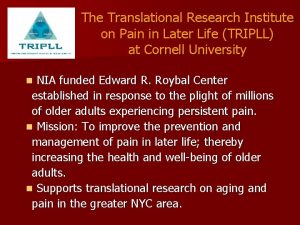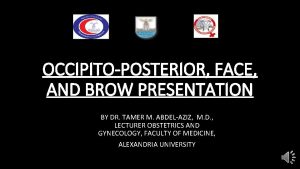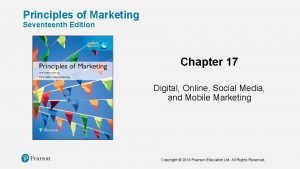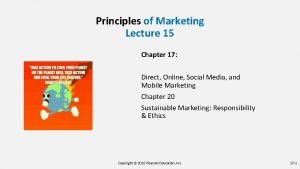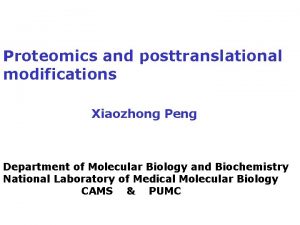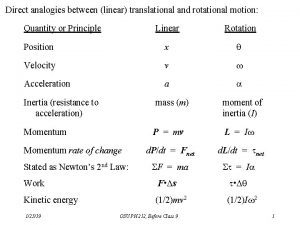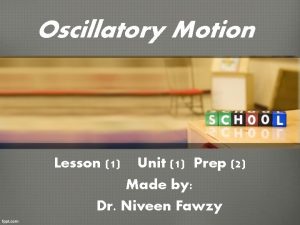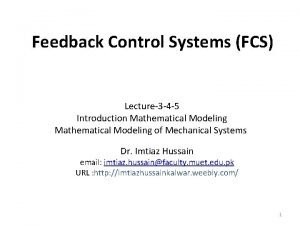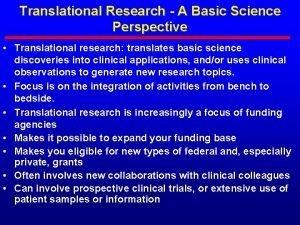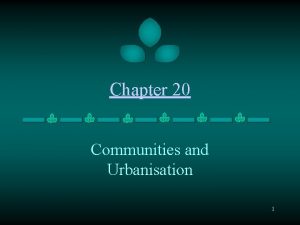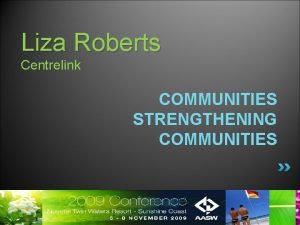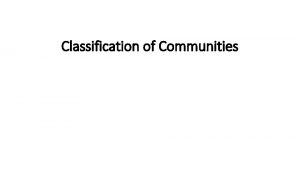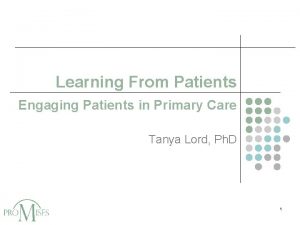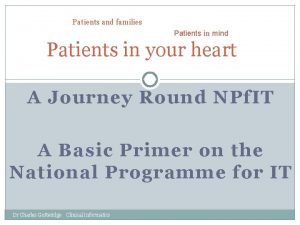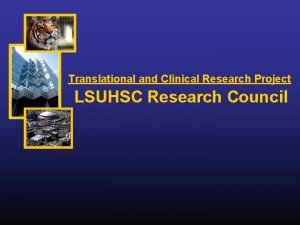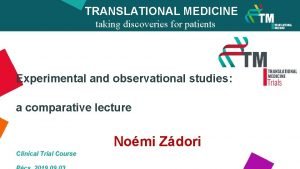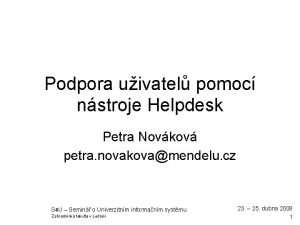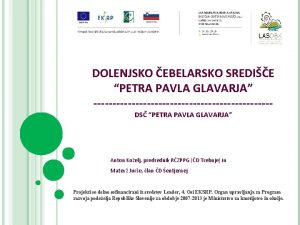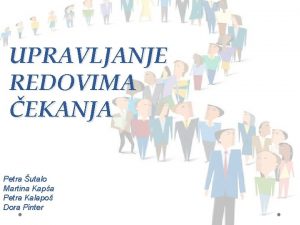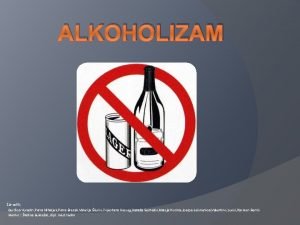Engaging Patients and Communities in Translational Research Petra























- Slides: 23

Engaging Patients and Communities in Translational Research Petra Kaufmann, MD, MSc, FAAN Director, Division of Clinical Innovation Director, Office of Rare Diseases Research Advancing the Science of Community Engaged Research September 15, 2017

National Center for Advancing Translational Sciences (NCATS) Mission • To catalyze the generation of innovative methods and technologies that will enhance the development, testing and implementation of diagnostics and therapeutics across a wide range of human diseases and conditions. • Study translation on a system-wide level as a scientific and operational problem, developing and supporting innovative collaborations across traditionally separate scientific disciplines and organizations, including government agencies, academia, industry and patient organizations.

Translation: From discovery to positive health outcomes Discovery Exploratory Research Confirmatory Research Clinic Health Outcomes 3

What is Translational Science? Translational Science is the field of investigation focused on understanding the scientific and operational principles underlying each step of the translational process. NCATS studies translation as a scientific and organizational problem.

Examples of patient and community engagement in NCATS programs • NCATS Toolkit for Patient-Focused Therapy Development • CTSA Program Community Partnerships • Recruitment Innovation in the Trial Innovation Network

The Toolkit • NCATS Toolkit for Patient-Focused Therapy Development • Patient group initiated and led program • Developed to facilitate therapeutics research and development by patient groups • Provides a web-based interface with a comprehensive collection of rare disease drug development tools • Aim is to provide an online one-stop resource targeted to patient groups • Useable • Accessible • Practical • Many tools not specific to rare diseases and useful to patient groups for all diseases and conditions – we welcome everyone to the site • Launched September 8, 2017 • https: //rarediseases. info. nih. gov/toolkit

Toolkit Website https: //rarediseases. info. nih. gov/toolkit

Toolkit: Guiding principles v Facilitate opportunities to bring groups together for greater synergy, identify gaps in available online resources that require development, and disseminate information to patient groups. v Provide a single portal with resources that patient groups can readily access along with context. v Convene partners across multiple sectors to create a central source for online educational and informational resources and tools. v Rather than re-create existing resources, the goal is to facilitate coordination. v Facilitate development of resources for patient groups and promote continuity across the translational research and drug development process. v Identify and fill gaps in online resources and disseminate information. Keep it simple from a “how to” perspective.

Toolkit Snapshot Tools organized into 4 topic areas (bins): Working together to advance rare diseases research • • Discovery Preparing for Clinical Trials and FDA Review After FDA Approval And a “Getting Started” tab

Community Engaged Research Component of the CTSA (Clinical and Translational Science Awards) Program Image source: http: //www. duq. edu/academics/community-engagedteaching-and-research/faculty/community-engaged-research

CTSA Program Strategic Goal: Engage patients and communities in every phase of the translational process • Develop new, and expand existing models, for stakeholder engagement, collaboration, and partnerships to advance translational science. • Engage stakeholders in collaborations to advance translation by contributing across the translational sciences spectrum. • Enable team science to become a major academic model.

CTSA Program Funding Opportunity Announcement (PAR-15 -304) Community Engagement (CE) section Defines communities broadly • • 12 Addresses CE as a scientific problem Integrates CE into leadership, research and communication at hubs Integrates CE across translational spectrum Acknowledges CE in academic policy and culturally competent training for staff fosters innovation, disseminate best practices

Boot Camp Translation (BCT) for Patient-Centered Outcomes Research: Partnering to create community specific approaches to improved health from population level evidence Overview: Developed by researchers at the University of Colorado CTSA Program Purpose: • The program works with patients/community members to make scientific findings and evidence-based guidelines easier to understand by using language, concepts, and materials that were accessible to their local communities. • The concept of Boot Camp Translation was a grassroots idea and was conducted with over 100 English and Spanish-speaking communities. Patients/Community members chose the health topics to be translated. Outcome: • Different communities of patients, providers, and payers responded favorably to the BCT process. • BCT is a reliable method for successful long-term community engagement. BCT promotes the development of successful community or practice interventions through community engagement.

Boot Camp Translation (BCT) for Patient-Centered Outcomes Research: Partnering to create community specific approaches to improved health from population level evidence Colorado Clinical and Translational Sciences Institutes (CCTSI) researchers are partnering with local community members to translate medical jargon and terminology into user-friendly terms and to facilitate clearer communication and dissemination of health promotion/disease prevention information to community members.

Community Engagement Studio Overview: Dr. Consuelo Wilkins from the Vanderbilt University Medical Center CTSA Program and the Meharry Vanderbilt Alliance has developed an approach called Community Engagement Studio (CE Studios). Purpose: CE Studios are “dynamic, roundtable sessions that are used to elicit patient, community, and/or other stakeholder input on a research project”. Outcome: The CE Studio model was highly valued by both researchers and patients/community members. Developers have since received funding from PCORI to test the model with traditional stakeholders.

Community Engagement Studio Example

CTSA Program Community Mentorship Helps Advance Multiple Sclerosis Research in Latinos Lilyana Amezcua, M. D. , a University of Southern California (USC) assistant professor and clinical neurologist, investigates the complex genetics of multiple sclerosis (MS) among Latinos in greater Los Angeles. Through the NCATS’ Clinical and Translational Science Awards (CTSA) Program-supported Community Mentorship Program at the Southern California Clinical and Translational Science Institute (SC CTSI), she developed new relationships with Latino patients and communities. This work strengthened her translational science skills and gave her a new understanding of her patients’ experiences, perceptions and struggles with MS. Dr. Lilyana Amezcua, center, is presented with the Health Professionals Volunteer Hall of Fame award from the National MS Society’s National Board Chair Eli Rubenstein and President and CEO Cynthia Zagieboylo.

Recruitment Innovation Center (RIC) • Our goal is to positively impact human health by improving participant enrollment and retention in multi-center clinical trials. • Achieving this goal will require sophisticated informatics-based recruitment tools and novel engagement approaches to accelerate recruitment and retention. Participant Trial

Improving Clinical Study Recruitment • Problem: Slow or failed recruitment leads to delays, inefficiency, increased costs • Affects substantial proportion of clinical studies • Informatics component: Investigators can’t find participants and vice-versa • Strategic component: Lack of participant understanding and effective outreach strategies, particularly to underrepresented groups • Solutions in progress • Innovation in education, outreach and engagement • CTSA Program Trial Innovation Network includes focus on innovations in recruitment 7

Recruitment Innovation Center (RIC) Key Principles Engagement and Trust • Key to recruitment is meaningful engagement: • • • Community engagement studios Use of social media Sharing results in a way that is accessible & timely Culturally-tailored materials Inclusive approaches to study design and recruitment • Develop a trust framework • • • Safety Fairness Honesty Communication Guided by psychosocial and environmental influencers

Recruitment Innovation Center (RIC) National Community Advisory Board Ensure operations and strategies are informed by the views of the broader community including the general public, patients, research participants and community providers. 9 -15 members with individuals representing: • patients or caregivers • racial/ethnic minorities • previously participated in a clinical trial • clinicians practicing in a non-academic setting • 1 -2 representatives from the Vanderbilt Institute for Clinical and Translational Research (VICTR) Community Advisory Council Criteria • Familiarity with health research • Confidence/ability/prior experience in an advisory or leadership role • Represents a community, patient, participant, or non-academic clinician perspective

RIC Supplement: Enhancing Minority Recruitment Test innovative approaches within trials: • Culturally-tailored messaging • Clinical trial recruitment plans created with minority communities • Training on approaches to engaging minorities and marginalized communities in clinical trials. Via a web-based portal, disseminate innovations in minority recruitment and engage underrepresented communities

Take-Home Messages • Partner collaboratively with communities across the entire translational research spectrum. • Consider interests of all partners. • Provide training and resources. • Share information and knowledge with all partners.
 Primary succession definition
Primary succession definition Primary control vs secondary control
Primary control vs secondary control Types of brow presentation
Types of brow presentation Dynamisch verbinden
Dynamisch verbinden Marketing involve engaging directly with carefully targeted
Marketing involve engaging directly with carefully targeted Marketing involve engaging directly with carefully targeted
Marketing involve engaging directly with carefully targeted 10/7
10/7 Post translational and co translation
Post translational and co translation Rotational motion
Rotational motion Ap physics 1 unit 7 mcq
Ap physics 1 unit 7 mcq Translational equilibrium
Translational equilibrium Lj wei
Lj wei Translational kinetic energy
Translational kinetic energy Oscillatory motion
Oscillatory motion Translational kinetic energy
Translational kinetic energy Translational kinetic energy formula
Translational kinetic energy formula Translational motion definition
Translational motion definition Translational kinetic energy formula
Translational kinetic energy formula Translational vs rotational motion
Translational vs rotational motion Translational criminology
Translational criminology Rolling without slipping
Rolling without slipping Translational speed formula
Translational speed formula Answer
Answer Duke translational medicine institute
Duke translational medicine institute

